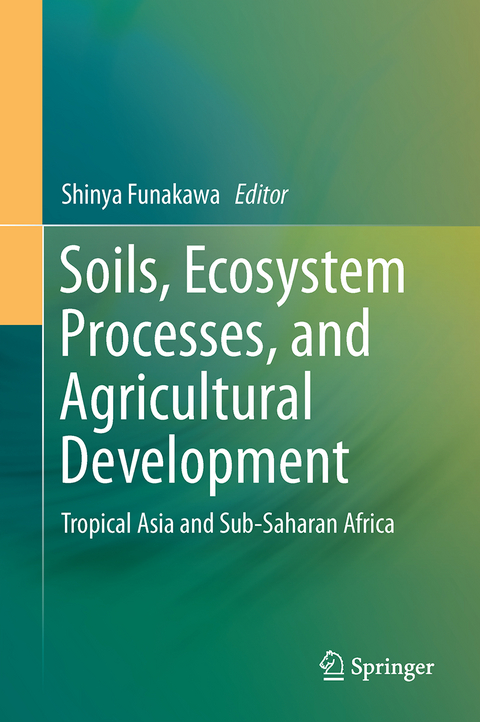
Soils, Ecosystem Processes, and Agricultural Development
Springer Verlag, Japan
978-4-431-56482-9 (ISBN)
Editor: Dr. Shinya FUNAKAWA (Dr. Agr.) Professor, Graduate School of Agriculture (and Graduate School of Global Environmental Studies, dual appointment), Kyoto University, Japan
1. Introduction (Shinya Funakawa).- Part I. Distribution of clay minerals in tropical Asia and Africa with special reference to parent materials (geology) and climatic conditions.- 2. Parent materials and climate control secondary mineral distributions in soil in Kalimantan, Indonesia (Tetsuhiro Watanabe and Supiandi Sabiham).- 3. Influence of climatic factor on clay mineralogy in humid Asia—Significance of vermiculitization of mica minerals under a udic soil moisture regime (Shinya Funakawa and Tetsuhiro Watanabe).- 4. Soil-forming factors determining the distribution patterns of different soils in Tanzania with special reference to clay mineralogy (Shinya Funakawa and Method Kilasara).- 5. Soil fertility status in equatorial Africa—A comparison of the Great Rift Valley regions and central/western Africa (Shinya Funakawa and Takashi Kosaki).- 6. Significance of active aluminum and iron on organic carbon preservation and phosphate sorption/release in tropical soils (Tetsuhiro Watanabe).- Part II Ecosystem processes in forest-soil systems under different geological, climatic, and soil conditions.- 7. Soil acidification processes under different geological and climatic conditions in tropical Asia (Kazumichi Fujii and Arief Hartono).- 8. Savannazation of African tropical forest critically changed the soil nutrient dynamics in East Cameroon (Soh Sugihara).- 9. Ecosystem processes of Ferralsols and Acrisols in forest-soil systems of Cameroon (Makoto Shibata).- Part III Human adaptation of agricultural practices in upland soils under different bio-climatic conditions in tropical Asia and Sub-Saharan Africa.- 10. Changes in elemental dynamics after reclamation of forest and savanna in Cameroon and comparison with the case in Southeast Asia (Makoto Shibata).- 11. Shifting cultivation in northern Thailand with special reference to the function of the fallow phase (Shinya Funakawa).- 12. Slash and burn agriculture in Zambia (Kaori Ando and Hitoshi Shinjo).- 13. Comparison of nutrient utilization strategies of traditional shifting agriculture under different climatic and soil conditions in Zambia, Thailand, Indonesia, and Cameroon—Examples of temporal redistribution of ecosystem resources (Shinya Funakawa).- 14. Interactions between agricultural and pastoral activities in the Sahel with emphasis on management of livestock excreta—A case study in southwestern Niger (Hitoshi Shinjo).- Part IV Possible strategies for controlling nutrient dynamics in future agricultural activities in the tropics.- 15. Control of wind erosion loss of soils and organic matter using the “Fallow Band System” in semi-arid sandy soils of the Sahel (Kenta Ikazaki).- 16. Process of runoff generation at different cultivated sloping sites in North and Northeast Thailand (Shinya Funakawa).- 17. Control of water-erosion loss of soils using appropriate surface management in Tanzania and Cameroon (Tomohiro Nishigaki).- 18. Utilization of soil microbes as a temporal nutrient pool to synchronize nutrient supply and uptake: a trial in the dry tropical croplands of Tanzania (Soh Sugihara and Method Kilasara).- 19. Conclusion (Shinya Funakawa).
| Erscheinungsdatum | 11.06.2017 |
|---|---|
| Zusatzinfo | 55 Illustrations, color; 71 Illustrations, black and white; IX, 392 p. 126 illus., 55 illus. in color. |
| Verlagsort | Tokyo |
| Sprache | englisch |
| Maße | 155 x 235 mm |
| Themenwelt | Naturwissenschaften ► Biologie ► Ökologie / Naturschutz |
| Naturwissenschaften ► Geowissenschaften ► Geologie | |
| Naturwissenschaften ► Geowissenschaften ► Mineralogie / Paläontologie | |
| Weitere Fachgebiete ► Land- / Forstwirtschaft / Fischerei | |
| Schlagworte | Environmental agronomy • Mineralogy • pedology • Soil ecosystems • Soil Resources • Tropical Agriculture |
| ISBN-10 | 4-431-56482-9 / 4431564829 |
| ISBN-13 | 978-4-431-56482-9 / 9784431564829 |
| Zustand | Neuware |
| Haben Sie eine Frage zum Produkt? |
aus dem Bereich


